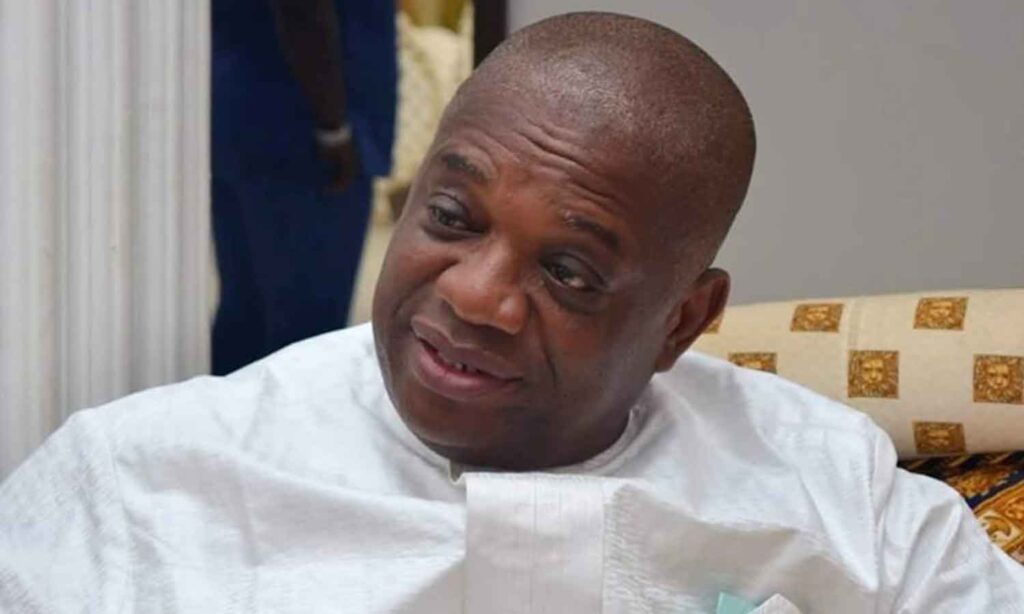LG autonomy: Supreme Court judgement divides former Governors Ibori, Kalu

By Emma Ogbuehi
The Supreme Court judgement on Thursday that granted financial autonomy to local government councils has divided former governors James Ibori of Delta State and Orji Uzor Kalu of Abia State.
Both Ibori and Kalu belong to the Class of 1999-2007 Governors together with President Bola Ahmed Tinubu who equally served within same period as Governor of Lagos State.
Tinubu, whose Minister of Justice, Lateef Fagbemi, filed the suit at the Supreme Court, has expectedly hailed the judgement.
But Chief James Ibori, former Governor of Delta State, said the judgement that granted financial autonomy to local government councils dealt a severe setback on the principles of federalism.
However, former Governor of Abia State, Orji Uzor Kalu, who is now a Senator, disagreed, hailing the judgement as courageous.
READ ALSO: 20 States with local government caretaker committees
LG allocations should be paid directly from Federation Account – Supreme Court
Supreme Court judgement, a setback on the principle of federalism – Ibori
Ibori in his X handle, said: “Supreme Court has dealt a severe setback on the principle of federalism as defined by section 162(3) of the 1999 Constitution (as amended).
“The section expressly provides thus: ‘Any amount standing to the credit of the Federation Account shall be distributed among the Federal and State Governments and the Local Government Councils in each State on such terms and in such manner as may be prescribed by the National Assembly.
“Section 6 provides further clarity on the subject matter. (6) Each State shall maintain a special account to be called ‘State Joint Local Government Account’ into which shall be paid all allocations to the Local Government Councils of the State from the Federation Account and the Government of the State.
“The court’s ruling on the matter is an assault on true federalism. The federal government has no right to interfere with the administration of Local Governments in under any guise whatsoever. There are only two tiers of government in a federal system of government.
“I’m opposed to fiddling with the allocations to the Joint LG Accounts at the state level but that in itself does not call for this death knell to the clear provisions of section 162 of the constitution. The implications of the ruling are far-reaching and the issues that readily come to mind are:
“1. Constitutional Interpretation: The Supreme Court’s ruling appears to contradict the explicit provisions of Section 162 of the 1999 Constitution. This raises questions about judicial interpretation and whether the court has overstepped its bounds in reinterpreting clear constitutional language.
“2. Balance of Power: The ruling potentially shifts the balance of power between the federal government and states. By allowing federal intervention in local government finances, it arguably centralizes more power at the federal level, contrary to the principles of federalism.
“3. State Autonomy: This decision could be seen as an erosion of state autonomy. States are meant to have significant control over their internal affairs, including the administration of local governments, in a federal system.
“4. Financial Independence: The ruling may impact the financial independence of states and local governments. If the federal government can directly intervene in local government finances, it could potentially use this as a tool for political leverage.
“5. Precedent Setting: This decision could set a precedent for further federal interventions in areas traditionally reserved for state governance, potentially leading to a more centralized system of government over time.
“That Local Governments must be ‘democratically elected ‘goes without saying. Yes, I agree, that’s the position of the constitution but withholding their allocation is not the way to go. It’s wrong.
“In the coming days, we will begin to fully understand the implications of the Supreme Court decision. An assault on the constitution is not the answer to fiddling with the Joint LG Account. If the ruling is saying Governors cannot tamper, touch, or fiddle with the Joint Accounts, that’s fine because they shouldn’t be doing that in the first place.
“But asking the Federal Government to pay Local Government allocations to the account of the Local Government directly will lead to utter chaos and avoidable friction in governance.
“Like the Hon. Justice Oputa JSC of blessed memory once said in describing the Supreme Court “we are not final because we are infallible, but we are infallible only because we are final”.
“It is my sincere hope that the judgement delivered today will be reviewed at the earliest time possible because it clearly stands the concept of federalism on its head.”
Orji Uzor Kalu hails Supreme Court judgement
But on his part, Kalu wrote: “The Supreme Court judgement on the autonomy of local governments is one that should be hailed and applauded especially for the courage and independence shown by the judiciary. The Supreme Court being a policy court did what is right and beneficial to the society. While it may look like interference in the states, we should accept that all the calls for end of insecurity, kidnappings and banditry has just begun with this autonomy granted to the local governments.
“When the local governments are in total control of their funds, there is flow of resources and activities in the local areas. For instance, when I was governor between 1999-2007, the autonomy of my local government chairmen was a major breakthrough to the success of my administration. The Local Government Chairmen built roads and gave contracts to local contractors. The Chairmen were able to take full responsibility of what happened in their local governments and crime was reduced to the barest minimum.
“I will also appeal to the Federal Government to consider making a case for local government elections to be conducted by Independent National Electoral Commission (INEC) instead of the State Independent Electoral Commission (SIEC). This will further strengthen the autonomy to the local governments and reduce the pressure on the state governments. When governance gets to the grassroots, it becomes easier to identify and hold the leaders responsible.
“I sincerely appeal to the 36 state governors to accept this judgement as a victory for democracy, victory for themselves and victory for all Nigerians.
“I also congratulate the President, H. E Bola Ahmed Tinubu; the Attorney General of the Federation Prince Lateef Olasunkanmi Fagbemi SAN and all the Supreme Court Justices that played a role in this landmark achievement for Nigerians. Let’s continue to keep our hopes alive”.











